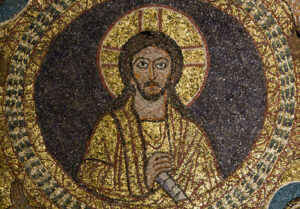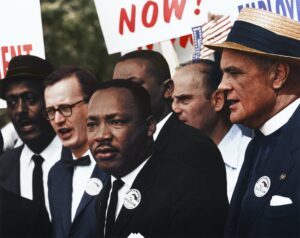“Then Jesus went with his disciples to a place called Gethsemane, and he said to them, “Sit here while I go over there and pray.” He took Peter and the two sons of Zebedee along with him, and he began to be sorrowful and troubled. Then he said to them, “My soul is overwhelmed with sorrow to the point of death. Stay here and keep watch with me.” Going a little farther, he fell with his face to the ground and prayed, “My Father, if it is possible, may this cup be taken from me. Yet not as I will, but as you will.” Then he returned to his disciples and found them sleeping. “Couldn’t you men keep watch with me for one hour?” he asked Peter. “Watch and pray so that you will not fall into temptation. The spirit is willing, but the flesh is weak.” He went away a second time and prayed, “My Father, if it is not possible for this cup to be taken away unless I drink it, may your will be done.”
Ever since Karl Marx described religion as the “opiate of the masses” in 1843’s Contribution to the Critique of Hegel’s Philosophy of Right, the operating assumption has been that radical leftist theorists are at best indifferent and at worst hostile to faith. There is some truth to this stereotype. While he isn’t likely to make many of our Christmas card lists, many progressives nodded along when Barak Obama disparaged conservative voters for clinging to “guns or religion.” Even a brilliant theorist like Wendy Brown gives into this temptation. In her excellent recent book, In the Ruins of Neoliberalism, Brown makes stellar use of Nietzschean analytics to explain the rise of Trump, but has little interest in taking the anti-Christ’s religious commentary seriously.
This is a serious problem since — contra the presumptions of the New Atheist wings of the Intellectual Dark Web — religion has not withered away. Nor have existential anxieties about matters of “ultimate concern” and meaning vanished, especially in a post-modern epoch of precarious neoliberal governance and the corrosion of democratic civic life.
This is one reason that Slavoj Žižek’s longstanding engagement with the Christian tradition is so important. Drawing on the most theoretically sophisticated forms of ideological critique, he goes well beyond the denunciation of religion as mere fanciful “ideology” which will evaporate once we adequately change material conditions. Instead, Žižek has dialogued with the Christian religious tradition in polemical, respectful, and always interesting ways. Understanding why Žižek takes Christianity seriously may help leftists understand not just the important of religion, but the debt Western radicalism owes to the Christian tradition. This can help the cause of making Christianity properly radical again.
Zizek and the Fragile Absolute
Žižek is an extremely prolific author. In addition to writing lengthy tomes on Hegel, Lacan, capitalism, and Alfred Hitchcock he has also dedicated a lot of ink to discussing the Christian legacy. This includes full length books like The Fragile Absolute, or, Why is the Christian Legacy Worth Fighting For? and sustained debates with “radical orthodox” theologians like John Millbank. Given Žižek’s prolificacy, his insights on Christianity are difficult to distill or systematize and his contribution to understanding the radical Christian legacy is hard to summarize.
Nevertheless, a few key points consistently emerge. The most important is ontological, though as we’ll see Žižek’s claims on these seemingly esoteric matters have serious political implications. In his sustained exegesis on G.K Chesterton, he praises the English novelist’s truly dialectical love of paradox but criticizes him for not pushing his insights far enough. Chesterton argues for a realist — we might even say scientific — Christianity that frames the world as a collection of independent objects and individuals, each what they are in themselves, which relate to one another in an empirically verifiable way.
This conception of realism has deep roots in the Aristotelian realism of figures like Thomas Aquinas, which in turn influenced the scientific method of the modern world. Chesterton is in agreement with the more pragmatic or encyclopedic elements of Enlightenment thought which stressed that the material world operates in a way that can be ascertained by reason and is more or less coincident with the “common sense” views of modern life. However, to sustain this realist vision Chesterton argued that we need to accept the existence of a transcendent God who exists outside of reality and designed the universe to operate in a stable and predictable fashion.
Chesterton anticipates self-described “post-modern conservatives” like Peter Lawler by insisting that if we abandon belief in this transcendent God we also lose the possibility of ontological realism — and the social roles that “naturally” flow from that realism. We’re left with a world where there are no constant and necessary laws of nature; everything that is becomes nominalistic. Nominalism holds that there is no universal essence to any object or individual, nothing that makes it both distinct in and of itself and a part of a greater whole. Everything is only a particular piece of matter in motion that is endlessly plastic.
This suggests that reality is open to endless reinterpretation and reinvention by subjective human input; there is no essential and universal features to the world, so everything can be manipulated. All that is solid melts into air. Or as Chesterton put it “when men choose not to believe in God, they do not thereafter believe in nothing, they then become capable of believing in anything.” Not coincidentally, this nominalism is horrifying to conservatives like Lawler or Patrick Deneen, since it seems to open the door to claims that “gender is a social construct” or “human sexuality can be endlessly remade,” given that there is no essence or telos to anything.
For Žižek, Chesterton’s ontology is interesting because it expresses the ideological role God is meant to play in sustaining our vision of the world. However, his response to this isn’t the cliché reply of orthodox ideological critique: that if it turns out we need to speculatively assert the existence of God to sustain our vision of the world, so much the worse for that vision. Žižeks innovative claim is to argue that the materialization of a transcendent God is precisely the most radical quality to Christianity. On Žižek’s reading the most explosive Christian innovation was to humanize the divine in the form of Jesus; a messiah who has moments of fear, self-criticism, and doubt about the efficacy of God the father’s plan.
This last point is key. If we take the Trinitarian claim seriously, according to Žižek we need to interpret passages like Matthew 26 or Christ’s dramatic cry of “my God, my God, why have you forsaken me” in a literal theological sense. God not only died but came to profoundly doubt himself. On this reading the notion of a staid transcendent deity who set the universe into orderly motion seems theologically implausible. Instead, we’re left with a human — all too human — God who second-guesses his plans but chooses, in an agapaic act of supreme sacrifice, to let his own beloved children put him to death.
Christianity and Radical Freedom
This rumination speaks to Christianity as a religion of radical freedom. The death of Christ on the Cross signifies the end of the transcendent and interventionist God who will act both as a stern patriarch to his creation and a formalistic lawgiver who sustains the laws of nature and the realism of the world. Instead, we are left with a God who appears to us in the free human community of the Holy Spirit where all are to be regarded as moral equals. Žižek puts it in his exchange with Milbank:
“It is only in this monstrosity of Christ that human freedom is grounded; and, at its most fundamental, it is neither as payment for our sins nor as legalistic ransom, but by enacting this openness that Christ’s sacrifice sets us free. When we are afraid of something (and fear of death is the ultimate feat that makes us slaves), a true friend will say something like: ‘Don’t be afraid, look, I’ll do it, what you’re so afraid of, and I’ll do it for free-not because I have to, but out of my love for you; I’m not afraid!” He does it an in this way sets us free, demonstrating in actu that it can be done.”
This last point is a crucial one for thinking through the implications of a radical Christian politics. Over the past decade fear has become an increasingly powerful motivator for the political right. What I call “post-modern conservatives” like Donald Trump present the world in apocalyptic terms; radicals and foreigners are besieging the shining city on the hill, and only he can stop them. Contra Chesterton, it is precisely the ideology of “common sense” that inspires millions to accept the fantasies of Trumpism as an antidote to fear — to interpret Trump “seriously but not literally” as the reactionary parlance goes.
Post-modern conservatives are frightened by the potential social disorder that emerges when there is too much freedom, and consequently too much difference. They long for a world of settled practices and easy moral distinctions, where everyone has — and knows —their place. The desire for order and fixed social hierarchies informs the conservative Christian nostalgia for an earlier era of cultural uniformity and ethno-religious homogeneity. The longing for a fantastical past motivates post-modern conservatives to gain political and executive power to construct a new world of “common sense” — suppressing or excluding those who don’t conform to their reactionary vision.
This makes them all the more susceptible to the lies and hyperreal agonistic politics offered by strongmen like Donald Trump. Trump masterfully appeals to the affective longing for order and stability, serving as a “middle finger” to the minorities, progressives and liberals who are supposedly responsible for the destabilization of the world.
Inspired by a Žižekian love of paradox, we should invert the Chestertonian axiom and say that only someone who insists on common sense will eventually believe in anyone and anything, because they have a set vision of the world from which any deviation must be ideologically dismissed and quashed through domination. Nothing expresses this better the constant denunciations of unnatural and deviant individuals and behaviors by post-modern conservatives — or as Sohrab Ahmari puts it, those who deny their “essential nature.”
By contrast, the radical Christian freedom uncovered by Žižek is resolutely critical, emphasizing the emancipatory movement of history and Christianity’s own role in destabilizing the “natural order” of things. It opens us to the contingency of the world, underscoring that human beings are capable of remaking reality for the better as part of a moral mission. Where ideology insists that things simply are what they are, and consequently that each person has their place in a natural and hierarchical social order, leftists should point out that things are what they are because each person is placed in an all too human and often unjust hierarchy that can and must be changed.
Much more could be said on these complicated points. We should by no means accept a purely Žižekian reading of Christianity; some Christians have creatively adapted his materialism while offering correctives to his ontology and heterodoxy. We should also retrieve other Christian doctrines associated with progressive causes that can provide theological insight and political guidance. Liberation theology is an especially interesting source of inspiration for a Christianity centered on a critique of common sense hierarchies. And since coalition building is important for radical Christians, it will be crucial to look to different religious outlooks across the globe.
Most to the point of this article, Žižek offers a model for how leftist theorists can engage Christianity both seriously and critically, rather than simply denouncing it as a distracting ideology. In a post-modern epoch characterized by the destabilization of sources of meaning, the renewal of dialogue between religion and the left is an important venture. We ignore it at our peril.
Matt McManus is a visiting professor of politics at Whitman College. He is the author of The Rise of Post-Modern Conservatism and Myth and the coauthor of Mayhem: A Leftist Critique of Jordan Peterson.




